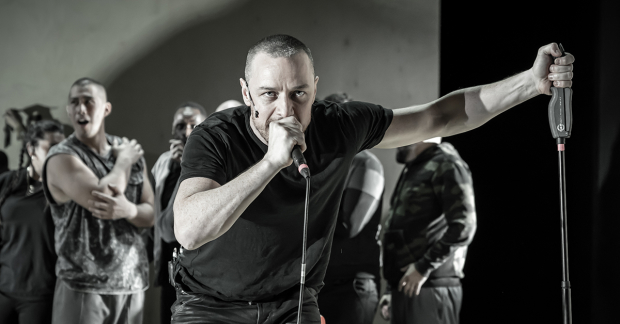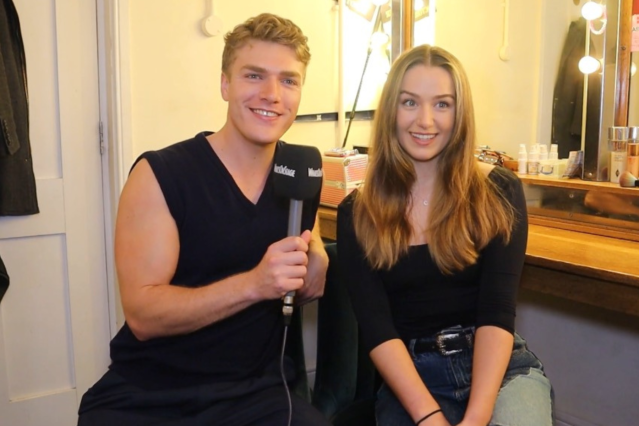Review: Cyrano de Bergerac (Playhouse Theatre)
Jamie Lloyd directs Martin Crimp’s version of the classic play, starring James McAvoy

© Marc Brenner
A play can knock your socks off when you least expect it. A revival of Edmond Rostand's 19th century verse drama about the legendary 17th century poet and fighter Cyrano de Bergerac doesn't, on paper, look like the kind of evening that will make you want to punch the air, even if it does star the electrifying James McAvoy.
But Jamie Lloyd's new production, working from a free translation by Martin Crimp, is really something else: funny, thrilling and deeply moving. It announces its intentions from the very first moment when the date 1640 is stamped above the stage, just as an effortlessly diverse 21st century cast appear, holding microphones, wearing everyday clothes, and telling the story in a form of poetry that is close to rap, complete with beatboxer.
For a long time, McAvoy's Cyrano remains hidden, sitting at the back of Soutra Gilmour's bare-bones set, which has steps rising at the rear, and a mirror in the centre reflecting the action and the thoughts of characters who sit facing it. When he swaggers into view, his nose is notably normal; the large appendage which disfigures Cyrano and which has been endlessly described before his entrance, has to be imagined not seen.
This invitation to suspend disbelief, to engage yourself in an active act of listening and imagination is the tightrope that Lloyd and his team walk: as they tell the story of how ugly but brilliant Cyrano uses the power of his words to win the heart of the beautiful Roxanne on behalf of the conventionally handsome but unfortunately dim Christian, the actors often gaze out from the stage, rather than looking at each other.
In the magnificent wooing scene, for example, where Cyrano propositions Roxane on behalf of Christian, the actors sit on a row of chairs, only McAvoy facing the audience. Talking quietly and intently – in Christian's voice – he seduces us as well as her, moving from an improvised aside ("Trust me, this will work. I've seen it in the film with Steve Martin") to a full expression of his thwarted passion. "I burn, and I burn with love."
McAvoy's voice is like honey, drawing you in, his eyes flashing. He holds us, as well as Roxane, in the palm of his hand. The power of Crimp's translation – funny, fluid, punchy, romantic – is that it makes you hear Cyrano's dazzling charisma while simultaneously helping you understand that this play is not a simple love story but a rousing defence of words themselves, their power to change things, their role in a society's freedom. This ties together the shift from the high comedy of the first act to the dark scenes of the second, where Cyrano and Christian are facing death.
Working with the team that brought together his magnificent Pinter productions, including Gilmour, lighting designer Jon Clark and Ben and Max Ringham on sound, Lloyd reveals breathtaking confidence and style. He understands the value of stillness as well as action, moving his cast around the stage in ways that seem simple but are incredibly sophisticated (additional movement by Polly Bennett).
The performances reveal the same subtle ability to hold together high-jinx and searing emotion. McAvoy is simply superb, using all his starry magnetism, energy and ability to mine feeling to create a vivid picture of a complex, unhappy, passionate man. As Roxane, Anita-Joy Uwajeh makes the most of the agency and liveliness Crimp's rethinking of the character gives her; she's not just a silly society beauty, but a woman trying to make her own way in a dangerously exposing world and she is as in love with the power of words as Cyrano himself, gradually finding her way towards self-realisation.
Eben Figueiredo is an unusually tender, tentative Christian, endearing in his puppyish adoration of Roxanne, delicately suggesting his disquiet about the way Cyrano has taken over his life. But the entire ensemble is magnificent, relishing the words, lending flair and intensity to their delivery. It is a triumph, a breathtakingly bold rethinking of a classic in resonant contemporary ways.






















